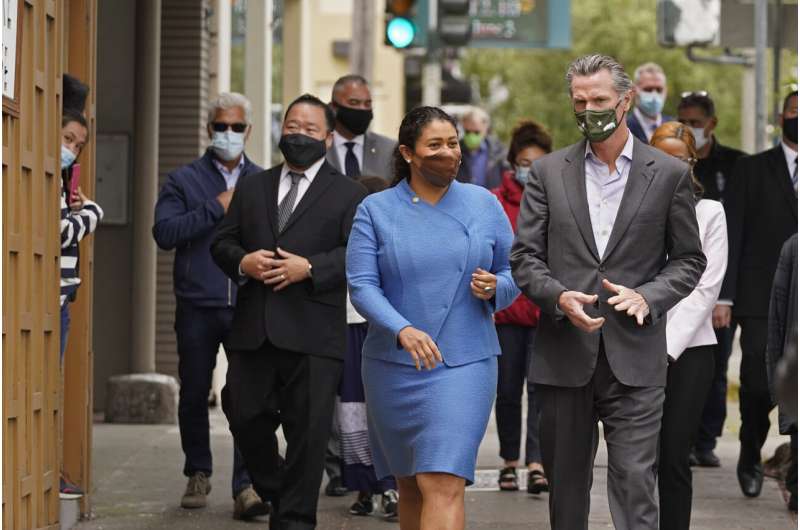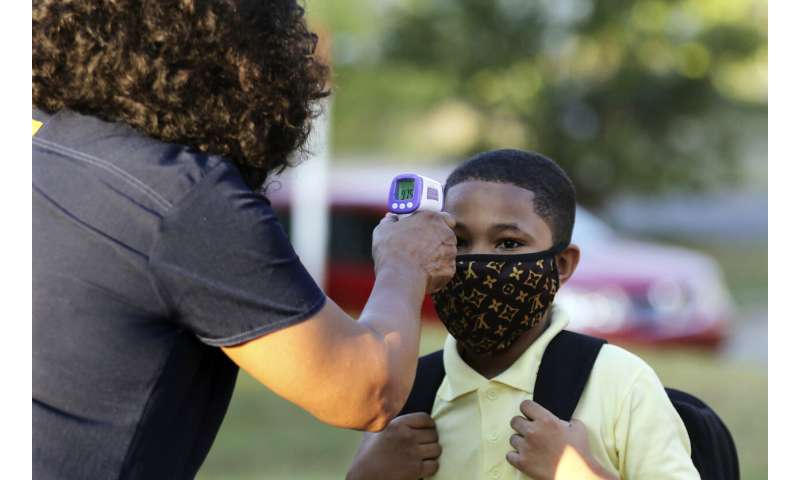
Hold on to that vaccination card. A rapidly growing number of places across the U.S. are requiring people to show proof they have been inoculated against COVID-19 to teach school, work at a hospital, see a concert or eat inside a restaurant.
Following New York City’s lead, New Orleans and San Francisco will impose such rules at many businesses starting next week, while Los Angeles is looking into the idea.
The new measures are an attempt to stem the rising tide of COVID-19 cases that has pushed hospitals to the breaking point, including in the Dallas area, where top officials warned they are running out of beds in their pediatric intensive care units.
Dallas County Judge Clay Jenkins said the situation is so dire that if a parent is seeking care for a sick or injured child, “your child will wait for another child to die. Your child will just not get on a ventilator. Your child will be care-flighted to Temple or Oklahoma City or wherever we can find them a bed, but they won’t be getting one here unless one clears.”
Earlier this week, Jenkins ordered that masks be worn inside schools, county buildings and businesses after a judge blocked Texas Gov. Greg Abbott’s ban on such rules. The county is not requiring people to show proof of vaccination.
On Friday, the Chicago school system, the nation’s third-largest district, with more than 360,000 students, announced it will require all its teachers and other employees to be fully vaccinated by mid-October unless they qualify for a medical or religious exemption.
Philadelphia has decreed that health care workers and college students and staff members must get their shots by mid-October.
New Orleans Mayor LaToya Cantrell called proof of vaccination the best way to protect businesses. She said she is not imposing capacity limits or contemplating a shutdown similar to the one that devastated businesses in 2020.
“Unlike this time last year, we have a tool that we did not have,” she said, referring to vaccines.
Over the past two weeks, Louisiana has set daily records for the number of people hospitalized with COVID-19, reaching 2,907 patients on Friday. Ninety-one percent of those hospitalized are unvaccinated, according to state data.
Louisiana’s Democratic Gov. John Bel Edwards sounded the alarm about the risks of overloaded facilities with too few staff to handle the crush of people with the coronavirus illness on top of the car crash victims, heart attack patients and others.
“We are rapidly getting to the point where we could have a major failure of our health care delivery system,” he said.
Officials hope the proof-of-vaccination requirement will translate into significant numbers of people getting the shots, something cash prizes and scholarships were unable to do.

Only 38% of Louisiana’s population is fully vaccinated. But the numbers of people seeking their first shot have increased dramatically over the past month, with nearly 46% of Louisiana’s residents starting the vaccine series.
In Oregon, Democratic Gov. Kate Brown plans to start deploying up to 1,500 National Guard troops next week to hospitals across the state to support health care workers dealing with spiraling cases driven by the spread of the more transmissible delta variant.
Critics say that requiring people to be vaccinated to enter a business violates their rights and their privacy.
At least 18 states led by Republican governors or legislatures prohibit the creation of so-called vaccine passports or ban public entities from demanding proof of vaccination. Several of those—including Alabama, Florida, Iowa, Montana, North Dakota and Texas—also bar most businesses from denying service to those who aren’t vaccinated.
In Salt Lake City, restaurant owner Mark Alston decided to require vaccination when he reopened in May. He thought his decision would draw “a little bit of publicity,” but the backlash came quickly in the form of hundreds of nasty phone calls, Facebook comments and emails.
“People were literally wishing death upon our family, our staff, everyone we knew,” Alston said. “They were cheering for our inevitable failure.”
Although his staff has had to turn away about 20% of patrons, Alston said he has no regrets: “I would personally feel like an incredible hypocrite to be running a restaurant that I knew was unsafe, that was contributing to the spread.”
President Joe Biden has urged cities to adopt proof-of-vaccination requirements for restaurants and other businesses.
New York City’s policy, which applies to restaurants, bars and other such venues, will go into effect on Monday, but inspections and enforcement won’t begin until Sept. 13—the week schools reopen. Customers will have to produce proof they have had at least one vaccine dose.
The city is also demanding that all of its municipal workers—including teachers and police officers—get vaccinated by mid-September or face weekly testing.
San Francisco went one step further than New York, requiring patrons at indoor restaurants, bars, gyms and entertainment venues to show they are fully vaccinated. The rule will take effect Aug. 20.
The Centers for Disease Control and Prevention issues people paper cards when they get their shots. California is among a few states that have established an online record with a barcode that people can use to prove their status. San Francisco’s mayor said a photo of the CDC card will suffice.
Los Angeles is considering a vaccine requirement at indoor businesses. Leaders there voted Wednesday to direct city attorneys to work out the details.
Also Wednesday, Gov. Gavin Newsom said all employees at public and private schools in California will have to show proof of vaccination or face weekly testing.
Melinda Deslatte and Olga R. Rodriguez

